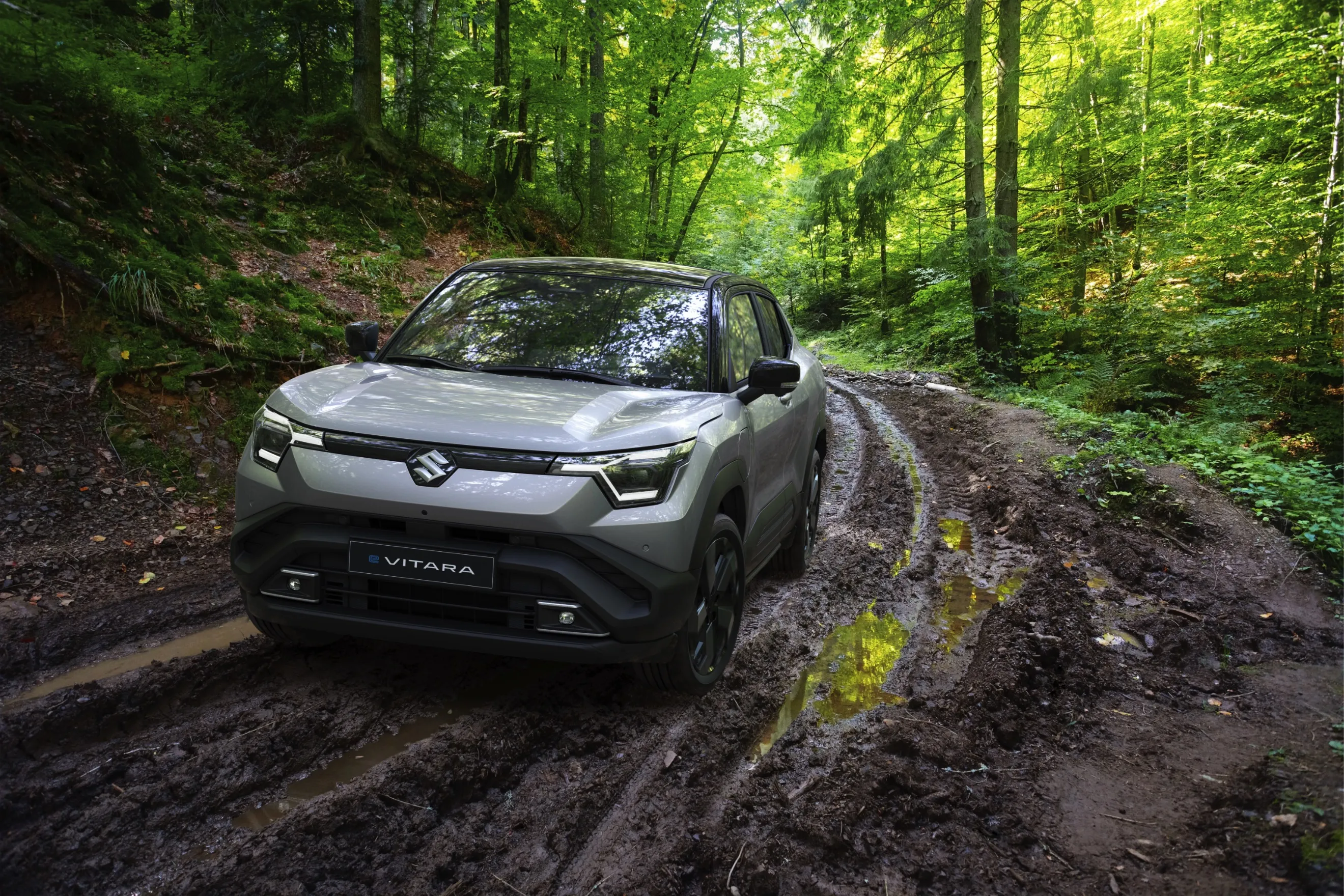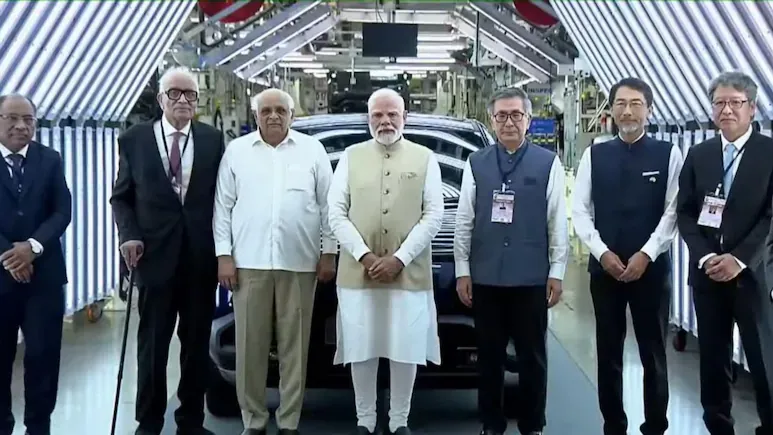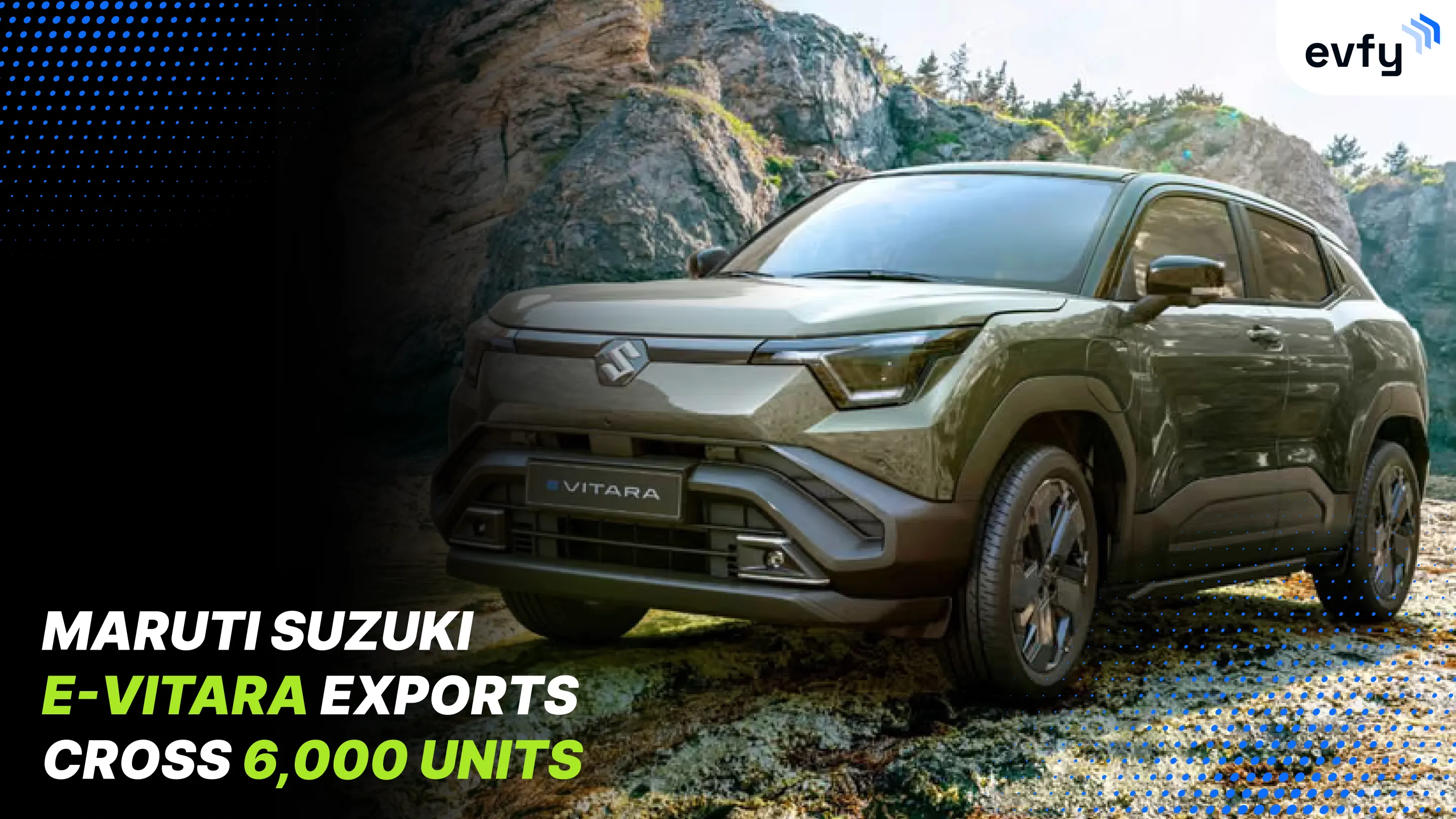Quick Highlights
- 6,068 e-Vitara units exported from Gujarat plant in August–September 2025
- Europe, UK lead demand with 2,900+ units in first batch
- Maruti Suzuki becomes India’s largest EV exporter in record time
- Domestic launch of e-Vitara SUV expected soon to rival Creta EV, Tata Curvv.ev
Maruti Suzuki Exports 6,000 e-Vitara EVs in Just Two Months; India Launch Coming Soon
India’s largest carmaker, Maruti Suzuki, has quietly achieved a historic milestone in the electric vehicle space. Its first all-electric SUV, the e-Vitara, has already shipped in significant numbers to global markets before even arriving on Indian roads. In just two months of production at the company’s Hansalpur plant in Gujarat, more than 6,000 units (6,068 to be precise) have been exported, positioning Maruti Suzuki as India’s biggest electric vehicle exporter.

Europe Leads Global Demand
The export drive began in August 2025, when the first batch of made-in-India e-Vitaras — more than 2,900 SUVs — was shipped to Europe and the UK. The numbers have grown quickly since then, with demand flowing in from key EV-friendly nations.
Among the early adopters of the Indian-made e-Vitara are Germany, Norway, France, Denmark, Switzerland, the Netherlands, Sweden, Hungary, Iceland, Austria, and Belgium. These countries represent some of the most mature electric mobility markets in the world, where stringent emission norms and strong consumer demand for EVs provide Maruti Suzuki with a ready customer base.
The rapid acceptance of the e-Vitara abroad signals global confidence in Maruti Suzuki’s first electric SUV and demonstrates the competitiveness of India-made EVs in international markets.
Gujarat Plant: Global EV Production Hub
The Hansalpur facility in Gujarat has now been established as Suzuki’s global production hub for the e-Vitara. The plant is strategically equipped with a multimodal automobile cargo terminal, providing direct connectivity to Mundra and Pipavav ports, ensuring streamlined exports to Europe and beyond.
The importance of this plant extends beyond exports. It will also supply the e-Vitara to Japan’s domestic market, underscoring India’s critical role in Suzuki’s worldwide EV strategy. By positioning India at the center of its global EV production, Suzuki is leveraging cost advantages, manufacturing scale, and supply chain strength.

Make in India Showcase
The export milestone gained national attention when Prime Minister Narendra Modi visited the Gujarat plant on August 26, 2025. He flagged off the production line of the e-Vitara and hailed Maruti Suzuki as a ‘Make in India’ brand ambassador.
This export success aligns strongly with India’s push to become a manufacturing and export hub for electric vehicles. Suzuki has already confirmed that the e-Vitara will be shipped to over 100 countries worldwide, a scale that could make India one of the most important nodes in Suzuki’s global EV ecosystem.

Why Exports Matter Before India Launch
Interestingly, while Indian consumers are still waiting for the e-Vitara’s official launch, global markets have already received thousands of units. This approach underlines two key strategies by Maruti Suzuki:
- Capturing global EV momentum: Countries like Germany and Norway already have mature EV markets, providing an immediate business opportunity.
- Strengthening India’s role as an exporter: The move boosts India’s position as a serious EV production base, building credibility ahead of domestic rollouts.
With 6,068 exports in just two months, the e-Vitara has given Maruti Suzuki a head start in EV leadership, not just in India but also in the global market.
e-Vitara: A Glimpse at the India Version
While exports continue, Maruti Suzuki is also preparing to introduce the e-Vitara in India soon. When launched, it will target the midsize electric SUV segment, taking on rivals such as the Hyundai Creta EV, Tata Curvv.ev, and MG ZS EV.
The India-spec model is expected to feature two battery pack options — 49kWh and 61kWh — offering up to 500 km of range on a single charge. Performance will include 144–172 bhp power output and quick DC fast charging from 0–80% in 50 minutes. Pricing is anticipated to fall in the ₹18–22 lakh range (ex-showroom), making it a competitive choice for Indian buyers.

Conclusion
With exports crossing 6,000 units in just two months, the Maruti Suzuki e-Vitara has already proven its global appeal before even debuting in its home market. Europe’s early adoption, the Gujarat plant’s rise as a global hub, and the strong ‘Make in India’ push combine to make this SUV a landmark product in India’s EV story.
As the India launch approaches, Maruti Suzuki finds itself in a unique position — not only preparing to challenge rivals like the Hyundai Creta EV on domestic turf but also showcasing India’s growing power as an EV exporter on the world stage.


